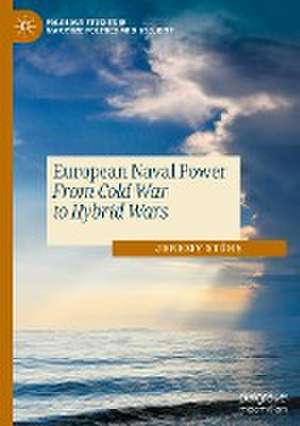European Naval Power: From Cold War to Hybrid Wars: Palgrave Studies in Maritime Politics and Security
Autor Jeremy Stöhsen Limba Engleză Hardback – 14 feb 2024
Preț: 792.81 lei
Preț vechi: 966.85 lei
-18% Nou
Puncte Express: 1189
Preț estimativ în valută:
151.75€ • 164.89$ • 127.55£
151.75€ • 164.89$ • 127.55£
Carte tipărită la comandă
Livrare economică 21 aprilie-05 mai
Preluare comenzi: 021 569.72.76
Specificații
ISBN-13: 9783031478758
ISBN-10: 3031478754
Ilustrații: XXVIII, 478 p. 14 illus., 5 illus. in color.
Dimensiuni: 148 x 210 mm
Greutate: 0.75 kg
Ediția:1st ed. 2024
Editura: Springer Nature Switzerland
Colecția Palgrave Macmillan
Seria Palgrave Studies in Maritime Politics and Security
Locul publicării:Cham, Switzerland
ISBN-10: 3031478754
Ilustrații: XXVIII, 478 p. 14 illus., 5 illus. in color.
Dimensiuni: 148 x 210 mm
Greutate: 0.75 kg
Ediția:1st ed. 2024
Editura: Springer Nature Switzerland
Colecția Palgrave Macmillan
Seria Palgrave Studies in Maritime Politics and Security
Locul publicării:Cham, Switzerland
Cuprins
.- Chapter 1 Evolution of European Naval Power.
.- Chapter 2 Cold War Roots.
.- Chapter 3 1991 – 2001: Enemy, where Art Though?.
.- Chapter 4 2001 – 2014 Land Wars and Financial Woes.
.- Chapter 5 2014 – 2022: Entering a New Age of Competition.
.- Chapter 6 From Competitive to Collaborative and Back Again?.
.- Chapter 2 Cold War Roots.
.- Chapter 3 1991 – 2001: Enemy, where Art Though?.
.- Chapter 4 2001 – 2014 Land Wars and Financial Woes.
.- Chapter 5 2014 – 2022: Entering a New Age of Competition.
.- Chapter 6 From Competitive to Collaborative and Back Again?.
Notă biografică
Dr. Jeremy Stöhs is an Austrian-American security and defense analyst and policy advisor. He is the Deputy Director of the Austrian Center for Intelligence, Propaganda & Security Studies at the University of Graz (ACIPSS) and is a senior fellow at the Institute for Security Policy at Kiel University (ISPK). His publications include The Decline of European Naval Forces: Challenges to Sea Power in an Age of Fiscal Austerity and Political Uncertainty (Naval Institute Press, 2018) and How High? The Future European Naval Power and the High-End Challenge (Djøef Publishing & Centre for Military Studies Copenhagen, 2021). Jeremy holds a Ph.D. in political sciences and regularly teaches at several universities and defense colleges.
Textul de pe ultima copertă
“In his latest work, Stöhs expands his analytical horizon to assess post-Cold War European naval operations, driven by national and transnational requirements, and their role within the traditional NATO alliance structure. Stöhs skillfully teases apart strategy, force structures, and operations to reaffirm a vital truth – that collective naval employment amongst NATO allies and partners remains the most desirable policy choice.”
— Admiral James Stavridis, USN, (Ret), 16th Supreme Allied Commander at NATO
“Western navies are facing both, a looming cold war and an ongoing hybrid war at sea. For that, they must be readied. This is the definitive study on European naval power and will be indispensable to policy-makers, naval analysts, military officers, and industry leaders alike.”
— Dr. Sebastian Bruns, Senior Researcher Institute for Security Policy, Kiel University
“Naval forces play a critical role in safeguarding Europe’s prosperity and constitute the linchpin upon which rests the defense of the transatlantic alliance. Stöhs does a masterful job in providing an in-depth view of the evolution of European naval power from the end of the Cold War to today’s era of hybrid threats.”
— Admiral James Foggo III, USN, (Ret), Former Commander of United States Naval Forces Europe-Africa and Allied Joint Force Command Naples
This book charts new waters in the study of European naval power. It explores the evolution of Europe’s navies from the final days of the Cold War to a period of hybrid wars and renewed strategic competition, manifest in Russia’s invasion of Ukraine and China’s increasingly aggressive behavior in the Asia-Pacific Region. The author highlights how inconsistencies and shortsighted naval policies have led to dangerous capability shortfalls and offers several recommendations for navies to navigate successfully the future maritime environment.
Dr. Jeremy Stöhs isa security and defense analyst, the Deputy Director of the Austrian Center for Intelligence, Propaganda & Security Studies (ACIPSS), and a Fellow at the Institute for Security Policy at Kiel University (ISPK).
— Admiral James Stavridis, USN, (Ret), 16th Supreme Allied Commander at NATO
“Western navies are facing both, a looming cold war and an ongoing hybrid war at sea. For that, they must be readied. This is the definitive study on European naval power and will be indispensable to policy-makers, naval analysts, military officers, and industry leaders alike.”
— Dr. Sebastian Bruns, Senior Researcher Institute for Security Policy, Kiel University
“Naval forces play a critical role in safeguarding Europe’s prosperity and constitute the linchpin upon which rests the defense of the transatlantic alliance. Stöhs does a masterful job in providing an in-depth view of the evolution of European naval power from the end of the Cold War to today’s era of hybrid threats.”
— Admiral James Foggo III, USN, (Ret), Former Commander of United States Naval Forces Europe-Africa and Allied Joint Force Command Naples
This book charts new waters in the study of European naval power. It explores the evolution of Europe’s navies from the final days of the Cold War to a period of hybrid wars and renewed strategic competition, manifest in Russia’s invasion of Ukraine and China’s increasingly aggressive behavior in the Asia-Pacific Region. The author highlights how inconsistencies and shortsighted naval policies have led to dangerous capability shortfalls and offers several recommendations for navies to navigate successfully the future maritime environment.
Dr. Jeremy Stöhs isa security and defense analyst, the Deputy Director of the Austrian Center for Intelligence, Propaganda & Security Studies (ACIPSS), and a Fellow at the Institute for Security Policy at Kiel University (ISPK).
Caracteristici
Examines European Naval Power from the end of the Cold War to the Ukraine War Looks at the role of naval fleets in international security Evaluates contemporary maritime and naval strategies in securing naval power








